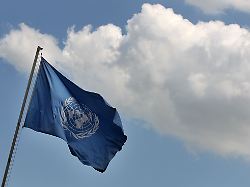Human rights activists are shocked
Saudi Arabia chairs the UN Commission on the Rights of Women
March 28, 2024, 10:03 a.m
Listen to article
This audio version was artificially generated. More info | Send feedback
The UN Commission on the Rights of Women will in future be chaired by Saudi Arabia. In an unopposed election, Abdulaziz Alwasil is elected to office by applause. Amnesty International and Human Rights Watch react with sharp criticism.
The global empowerment of women and gender equality will in future be in the hands of Saudi Arabia. Abdulaziz Alwasil, his country’s permanent representative to the United Nations since 2016, will take over as chairman of the UN Commission on the Rights of Women. There was no opposing candidate. The kingdom, which has been heavily criticized internationally for human rights violations, has received support primarily from countries from the Asia-Pacific region. The 63-year-old was elected to office by acclamation, i.e. approving applause, from representatives of 45 nations.
Even before the election, Alwasil’s predecessor, the Filipino Antonio Manuel Lagdameo, asked those present in the hall whether there was any opposition to the candidate; there was silence. Lagdameo is stepping down after just one year. Normally, the office stipulates that a country is at the top for two years. As the Guardian reports, the withdrawal apparently came about under pressure from several countries in Asia. Actually, Bangladesh was supposed to take over, but then Saudi Arabia got in the way.
Experts see this as the next step in improving one’s own reputation and offering oneself as a powerful partner internationally. For years, the desert state has been trying to cultivate its image with sportswashing worth billions. Recently, football clubs in the domestic league in particular caused a stir with gigantic purchases of stars.
“Shocking disregard for women’s rights”
Human rights organizations reacted outraged. Saudi Arabia has come under international criticism because it repeatedly commits serious human rights violations and massively restricts women’s rights. Sherine Tadros, Amnesty International’s New York office director, said: “Saudi Arabia is now in the lead, but Saudi Arabia’s own record on women’s rights is abysmal and far removed from the commission’s mandate.” Next year will also mark the 30th anniversary of the Beijing Declaration, a groundbreaking draft for the global promotion of women’s rights. “Whoever holds the chair will be in a key position to influence planning, decisions, stocktaking and outlook in a crucial year for the Commission,” said Tadros.
Louis Charbonneau, the director of Human Rights Watch at the United Nations, wrote at The country should not claim the presidency because it punishes women for fighting for women’s rights. He criticized the silence of other countries that did not prevent the election. The Saudi mission did not respond to a request for comment, according to the Guardian. Instead, representatives pointed to the “Personal Status” law, introduced in the country two years ago, as evidence of progress in women’s rights.
Women have been allowed to get driving licenses for a few years now. The law also stipulates that women must obtain permission from a male guardian to marry. She must also obey her husband “appropriately”. Their financial resources depend on this obedience. Amnesty International also says a leaked draft of an upcoming new criminal code “does not protect women and girls from all forms of gender-based violence.”
